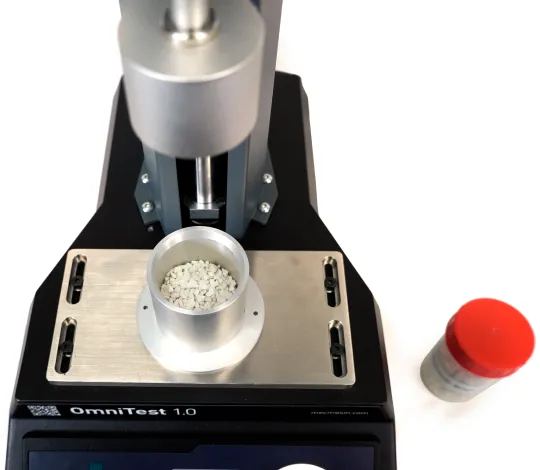Crush strength testing of catalyst pellets


Solution
- Software-controlled compression test system
- Steel self-levelling compression plates
- Sample container and plunger fixture for bulk testing
Benefits
- Testing of all pellet geometries on the same machine
- Software control for repeatable testing to multiple materials standards
Requirement
Catalysts are widely used in industrial processes where yield and time issues are critical to forming a product as soon as possible. They decrease the activation energy required for a particular reaction and often speed up the reaction by working at a comparatively lower temperature.
To perform efficiently, catalysts not only need excellent adsorption properties but also good physical strength characteristics. Mechanical failure of porous pellets can result in small fragments and fine particles being formed, which create blockages in fluid flow, unacceptable pressure drops across the reactor and variations in heat transfer. Determining the mechanical strength of solid catalysts is therefore one of the key parameters for ensuring a reliable and efficient reaction process.
Commercial catalysts come in a wide variety of shapes such as pellets, granules, tablets, spheres, rings and extrudates, and are often brittle in nature with very little deformation before fracture. This presents non-trivial challenges when testing, which has resulted in the development of several test standards according to the different geometries and types of catalyst.
Solution
ASTM D4179—Single Pellet Crush Strength of Formed Catalysts and Catalyst Carriers—covers measuring the compressive ‘side crush strength’ (SCS) of single pellets in a regular form, such as spheres, short cylinders or tablets. It allows for testing as a radial or axial crush, although it should be noted that axial crush strength is much higher and less representative of catalyst behaviour in the reactor than radial crush. Force is applied at a uniform rate to the pellet until it crushes or collapses and the maximum crush strength (at point of initial collapse) recorded.
ASTM D6175— Radial Crush Strength of Extruded Catalyst and Catalyst Carrier Particles—covers measuring the compressive ‘side crush strength’ (SCS) of single extruded catalysts of 1.6 – 3.2 mm diameter having a length to diameter ratio of ≥ 1:1. It only allows for testing as a radial crush. Force is applied at a uniform rate to the pellet until it crushes or collapses and the force per millimetre of deformation is recorded. It is a suitable method for measuring crush strength between 0 – 65 N/mm.
When the catalytic material is made from irregular particles, it is not possible to make meaningful tests using the single pellet strength methods. It is therefore common in industrial applications to perform ‘bulk crush strength’ (BCS) testing of a bed of formed catalyst particles, which is covered by ASTM D7084— Determination of Bulk Crush Strength of Catalysts and Catalyst Carriers.
ASTM D7084 covers catalyst particles of 0.8 – 4.8 mm diameter such as granules. Particles are contained in a cylindrical sample holder and crushed with a piston. Pressure is applied at a uniform rate to the bed of particles, held for 30 seconds and slowly released. The pressure which causes 1% of fines (particles which pass through a sieve of half-size of the pellet) is recorded and typically lies between 0.1 – 0.35 MPa for granules and 1 – 3.5 MPa for larger formed materials.
Mecmesin’s UTM force test systems are ideal for performing both single pellet and bulk crush strength testing of catalytic materials. A robust test frame is fitted with a precision loadcell and controlled by powerful yet easy-to-use software. Data is collected at 1 kHz to accurately capture sudden fractures and is clearly plotted on a graph to show the true mechanical strength characteristics of the specimen. The calculation of mean crush strength is performed with a clear pass/fail indication for the operator and direct export of the results to Microsoft™ Excel.
A full range of self-aligning compression steel plates are available for the single pellet crush test and a succulometer jig, or a custom-made piston and container fixture for the bulk crush test of particles, pellets and granules.
Test equipment
- OmniTest (replaces MultiTest-i)
- Self-levelling compression plate(s)
- Custom-designed, or standard succulometer/dual-extrusion fixture
- Force testing software





